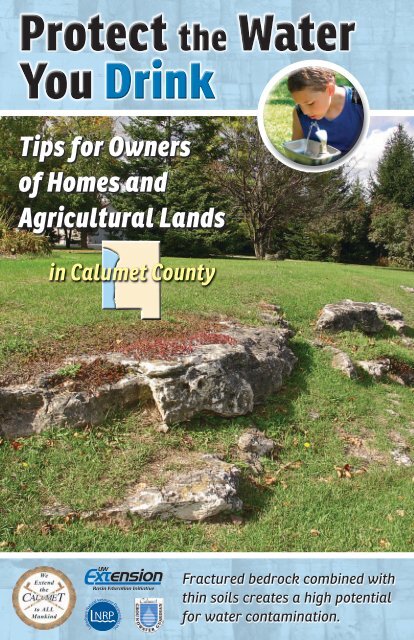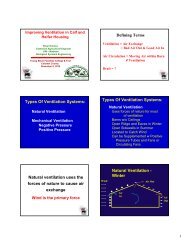Protect Your Drinking Water - Calumet County
Protect Your Drinking Water - Calumet County
Protect Your Drinking Water - Calumet County
- No tags were found...
Create successful ePaper yourself
Turn your PDF publications into a flip-book with our unique Google optimized e-Paper software.
Tips to keep your water cleanKnow the threats: Minimize your risksIf you are aware of the threats, you can take action to reduce the risks ofcontaminating your water and that of your neighbors. <strong>Water</strong> resources canbe threatened by:• Barnyards and other areas where manure accumulates.• Cropland and lawns where fertilizers, chemicals or manure are applied.• Malfunctioning septic systems.• Rainwater or snowmelt runoff from roads and other paved areas.• Improper household waste disposal.WELL THATIS IN USEUNUSEDWELLSINKHOLELIMESTONEAT OR NEARSURFACEKarst regions have bedrock with connecting cracks and layers betweenrocks that easily transport water and pollutants to the groundwater.8
Test your well waterADDITIONAL WELL WATER TESTS TO CONSIDER<strong>Protect</strong> the water you drink – Keep it cleanAs a homeowner with a private well, it is your responsibility to have your watertested regularly and to know it is safe to drink. It is recommended that all privatewells be tested at least once per year for coliform bacteria and more often ifchanges in water taste, odor or color are noticed. <strong>Calumet</strong> <strong>County</strong> well ownersmay benefit from more frequent testing to detect seasonal or weather-relatedtrends. There may be additional tests for you to conduct, based on activities aroundyou, or if bacteria levels indicate that your well is vulnerable to contamination.Source: WDNR publication, Tests for <strong>Drinking</strong> <strong>Water</strong> from Private Wells. PUBL-DG-023 2007Contaminant Which wells or homes should be tested? How often should I test?NitratePesticidesVOCs(solvents,gasoline,fuel oil)PCBsArsenicLeadCopper• All wells in <strong>Calumet</strong> <strong>County</strong> with noprevious testing history• Wells with previous tests resultsexceeding 5 ppm• Wells used by pregnant women orinfants.• Well is within ¼ mile of agriculturalfields, orchards, or pesticide manufacturing,storage or mixing facilities.• Wells within ¼ mile of a landfill,underground fuel or gasoline tankand wells within ¼ mile of wheresolvents have been used (dry cleaner,automotive garage, body shop, etc.).• <strong>Water</strong> with an oily sheen orpetroleum odor, and submersiblepump installed before 1979.• Every well, especially those nearformer or current orchard sites.• Wells near orchards.• Homes with copper plumbinginstalled before 1985 or with brassfixtures; and naturally-soft water.• <strong>Water</strong> used to prepare infant formulaor if any resident in home experiencesrepeated symptoms of nausea,diarrhea or abdominal cramps.Homes most at risk have new copperplumbing or naturally-soft water.• Annually• Quarterly testing for 1 year• Test after heavy rains orsnowmelt• Recommended to determineif nitrate levelsfluctuate seasonally orare event-related.• Test before pregnancyand at time of birth.• Once every 5-10 years.• Test once every5-10 years or whensolvent or gasoline tasteor odor is noticed.• Test once if needed.• Test once.• Test annually if arsenicis present.• Re-test if iron levelsincrease or if waterchanges in taste or odor.• Consider one-time test.• Homes with new copperplumbing should bere-tested in 6 months.• Test before and afterflushing the faucet for2-3 minutes.9
This winter aerial view makes bedrock cracksobvious. In places like this, extra care isneeded to prevent surface pollution fromentering groundwater.Report observations of water suddenlydisappearing in a road ditch to the townshipor county road department. This mayindicate a new sinkhole.Minimize risks of groundwater contaminationON YOUR FARM• Develop and followa nutrient managementplan for yourland to optimizeyields without usingmore fertilizer thanWisconsin DNR Spill Hotline: (24 hours/day)1-800-943-0003Report fuel, manure, pesticide, and otherhazardous and solid waste spills immediately!<strong>Your</strong> call will activate professional responseand clean-up crews.needed. Inquire at the <strong>Calumet</strong> <strong>County</strong> LWCD or NRCS forassistance and cost-sharing opportunities.• Do not apply manure, fertilizers, pesticides or other agriculturalchemicals near wells, sinkholes, fractures, exposed bedrockor ditches.• Do not apply manure during frozen or snow-covered conditionsor in areas where machinery is able to scrape bedrock.• Incorporate manure into the soil immediately upon application.• Barnyard runoff can be controlled by a variety of bestmanagement practices. Contact <strong>Calumet</strong> <strong>County</strong> LWCD orNRCS for cost share opportunities.(continued on pg. 12)10
DrinkTips for Ownersof Homes andAgricultural Landsin <strong>Calumet</strong> <strong>County</strong><strong>Calumet</strong> Groundwater Guardians(<strong>Calumet</strong> GGs) is a non-profitorganization committed to increasingawareness of ground waterissues in the area and encouragesprotection of local groundwaterresources. <strong>Calumet</strong> GGs participatein the Groundwater GuardianCommunity Program through the GroundwaterFoundation (www.groundwater.org).Current <strong>Calumet</strong> GG projects:• Provide educational materials for rainbarrels and offer assembled rainbarrels at reasonable costs• Provide educational materials for raingardens and maintain local demonstrationrain gardens• Assist with local private well testingevents within <strong>Calumet</strong> <strong>County</strong>• Seek grant funding to assist wellownerswith well testing costs• Host a groundwater education night annually• Provide scholarships to the Sand LakeConservation Camp for middle schoolchildren• Provide educational materials at variouslocal events to educate people aboutgroundwater• Assist with <strong>Calumet</strong> <strong>County</strong> Clean SweepsWant to be a member of <strong>Calumet</strong>Groundwater Guardians? ContactKathleen Depies at (920) 849-9459 oremail: depies.kathleen@charter.netCHECK OUT CALUMET GGs’ RAIN GARDENS:- Rain garden at Parts Depot in Chilton- Katie Hemauer Memorial Rain Garden atLedge View Nature CenterBased on <strong>Protect</strong> the <strong>Water</strong> You Drink in Door <strong>County</strong> researched and written byDebbie Beyer, UW-Extension Basin Education Initiative; and Shelby Giguere, Door<strong>County</strong> Soil and <strong>Water</strong> Conservation Department. Reviewed by Laurel Braatz,Wisconsin Department of Natural Resources; Kevin Erb, UW-Extension EnvironmentalResources Center; Door <strong>County</strong> Soil and <strong>Water</strong> Conservation Department; and KevinMasarik, UW-Extension Central Wisconsin Groundwater Center. 2009<strong>Calumet</strong> <strong>County</strong> revisions by: Debbie Beyer, UW-Extension and Danielle Santry,<strong>Calumet</strong> <strong>County</strong> Land & <strong>Water</strong> Conservation Department. 2010Graphic design by: Jeffrey J. Strobel, UW-Extension Environmental Resources Center.Photos courtesy of: <strong>Calumet</strong> <strong>County</strong> Land & <strong>Water</strong> Conservation Department, Door<strong>County</strong> Soil and <strong>Water</strong> Conservation Department, Manitowoc <strong>County</strong> Soil and <strong>Water</strong>Conservation Department, Fond du Lac <strong>County</strong> Soil and <strong>Water</strong> Conservation Department,and UW-Extension staff Peggy Compton, Jeffrey J. Strobel, and Debbie Beyer.



